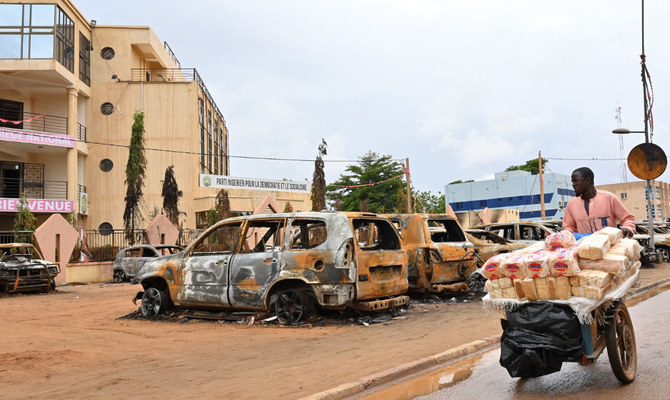NIAMEY, Niger: Nigeria’s President, Bola Tinubu who is also head of the West African bloc ECOWAS, has not ruled out military intervention in Niger but believes diplomacy is the “best way forward” to resolve the crisis, his spokesman said Tuesday.
President Bola Tinubu weighed in for the first time since the soldiers behind the coup in Niger defied the bloc’s Sunday deadline to reinstate elected president Mohamed Bazoum or face the possible use of force.
Meanwhile efforts by ECOWAS and the United States to parlay with Niger’s new rulers have made no headway ahead of a crisis summit in the Nigerian capital Abuja on Thursday.
“No options have been taken off of the table,” Tinubu’s spokesman Ajuri Ngelale said, while adding that Tinubu and other West African leaders favor diplomacy.
The United States said it still held out hope for reversing the coup but was “realistic” a day after a top US envoy made no visible progress in an unannounced visit.
“We do have hope that the situation will be reversed but at the same time, we are making clear, including in direct conversations with junta leaders themselves, what the consequences are for failing to return to constitutional order,” State Department spokesman Matthew Miller told reporters.
Earlier, the soldiers who seized power in Niamey on July 26 blocked a mission by ECOWAS ahead of the summit.
In a letter, the coup leaders said that public “anger” triggered by ECOWAS sanctions meant the delegation’s safety could be at risk.
ECOWAS — the Economic Community of West African States — imposed trade and financial sanctions on Niger after the rebel soldiers toppled Bazoum.
The bloc also gave Niger a seven-day ultimatum to reinstate Bazoum or face potential use of force, but the coup leaders defied the warning.
A source close to ECOWAS said Monday that military intervention was not being immediately envisaged and that the path to dialogue still appeared open.
The bloc sought to send a delegation to Niamey on Tuesday ahead of the crisis summit due to be held in Abuja, the Nigerian capital, on Thursday.
But the coup leaders’ letter, dated Monday, said: “The postponement of the announced mission to Niamey is necessary, as is the reworking of certain aspects of the (delegation’s) schedule.”
The schedule “includes meetings with certain personalities which cannot take place for obvious reasons of security given the atmosphere of the threat of aggression against Niger,” it said.
ECOWAS is struggling with a cascade of coups that since 2020 have now hit four of its 15 members.
In Mali, Burkina Faso and now Niger, all of the takeovers have been fueled by jihadist insurgencies that have claimed many thousands of lives, forced at least two million from their homes and dealt crippling blows to some of the world’s poorest economies.
On Monday, Victoria Nuland, a veteran US envoy, met with Niger’s military rulers for more than two hours but came away empty-handed.
She described her talks as “extremely frank and at times quite difficult.”
She said she offered the coup leaders “a number of options” to end the crisis and restore relations with the United States, which like other Western nations has suspended aid.
“I would not say that we were in any way taken up on that offer,” she told reporters before her departure.
Niger’s new strongman, General Abdourahamane Tiani, did not attend the meeting, and Nuland was unable to see Bazoum, who has been detained since July 26.
The military leaders in Mali and Burkina Faso have expressed solidarity with Niger, saying that any military intervention would be seen as a “declaration of war” against them.
Algeria, which shares a long land border with Niger, has also cautioned against a military incursion, which President Abdelmadjid Tebboune said would be “a direct threat” to his country.
Bazoum, 63, was feted in 2021 after winning elections that ushered in Niger’s first-ever peaceful transition of power.
He took the helm of a country burdened by four previous coups since independence, and survived two attempted putsches before he himself was ousted.
His support was a key factor in France’s decision last year to refocus its Sahel anti-jihadist mission on Niger after withdrawing from Mali and Burkina Faso.
France has 1,500 troops in Niger and the United States has 1,000 personnel, most of whom are deployed at two major air bases.
Mali and Burkina Faso sent letters Tuesday to the United Nations and the African Union, calling on them to prevent “military intervention against Niger” where the security and humanitarian consequences of such action “would be unpredictable.”
